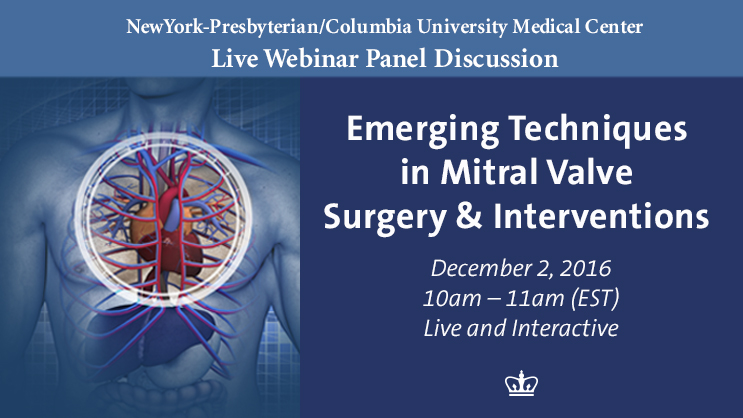
Click Here to Watch the Webinar »
Faculty
Michael Argenziano, MD
Michael Borger, MD
Isaac George, MD
Program Description
Emerging Techniques in Mitral Valve Surgery is a non-CME webinar discussion, which will focus on education leading to improved patient care and better outcomes for those with Mitral Valve disease.
Target Audience
This activity is designed for general practitioners, general and interventional cardiologists, arrhythmia specialists, and cardiothoracic surgeons.
Educational Needs Assessment
Despite therapeutic advances that improve longevity and quality of life, mitral valve disease remains a relentless clinical probem that is notoriously underdiagnosed and persistently undertreated. Open heart surgery has been established as the clear standard of care to treat most forms of mitral valve disease, and complex mitral valve repair can now be reliably performed using minimally invasive techniques. In addition, percutaneous procedures on the mitral valve, such as transcatheter mitral valve replacement and transcatheter mitral valve repair, are emerging as possible treatment modalities in patients too sick for surgery.
Patient selection and degree of disease allow for the appropriate approach to repairing or replacing the mitral valve. Concomitant atrial fibrillation is very common in such patients and may affect the mitral valve treatment choice. Possible options include simple and complex mitral repair, percutaneous and minimally invasive techniques including the mitral clip, transcatheter mitral valve replacement, and thoracoscopic procedures for atrial fibrillation.
This program will explore the current standard of care for patients with mitral valve disease with specific focus on 1) patient selection for advanced therapies and appropriate referral times; 2) current indications for mitral valve repair and replacement in both functional and degenerative mitral valve disease; 3) potential complications and available treatments; and 4) review of new technologies and ongoing trials.
Learning Objectives
At the end of this program, the attendees will be able to:
- Discuss challenges of managing severe mitral valve disease
- Understand issues pertaining to mitral valve disease and atrial fibrillation
- Recognize appropriate procedures for various clinical settings (open vs. percutaneous)
- Highlight standard of care therapy for functional and degenerative mitral valve disease
